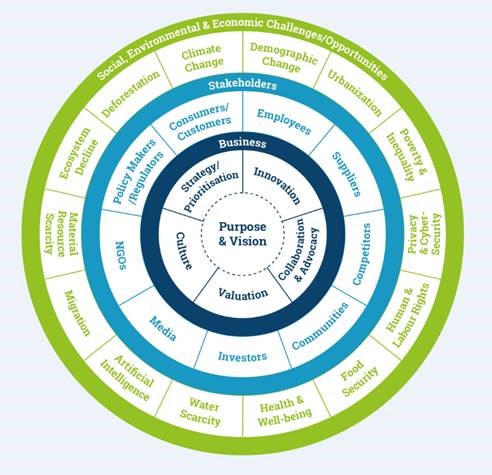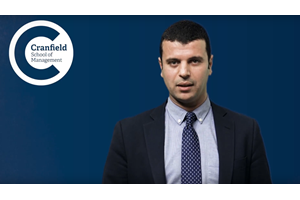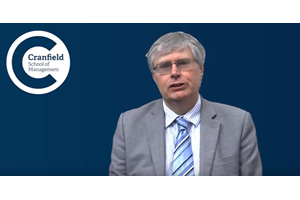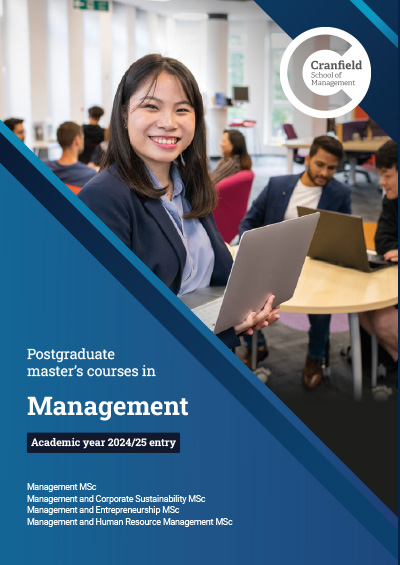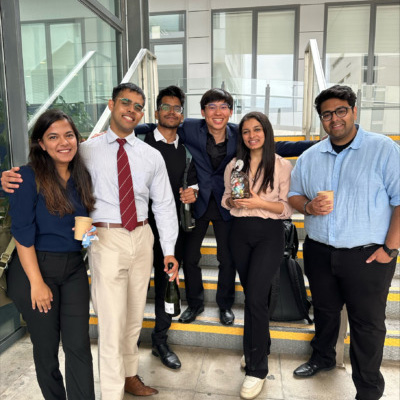Important information for international students – read more »
Merit-based Scholarship – 10-20% of tuition fee available – find out more »
New global top 10 sustainability ranking for Cranfield University – read more »
» Register for our Open Day on Wednesday 4 September
» Register to gain access to our on-demand content hub and explore exclusive course content
Overview
- Start date30 September 2024
- Duration13 months
- DeliveryTaught modules 60%, thesis (internship based or traditional) 40%
- QualificationMSc
- Study typeFull-time
- CampusCranfield campus
Who is it for?
- Graduates with a desire to develop their knowledge and skills in management before seeking their first professional role.
- Early career professionals with a passion for business and aspirations to take their career to the next level.
If you have three or more years of professional experience then the Transformation MBA is likely a better fit for your career aspirations.
Rankings
This course is recognised in International Business Rankings, consistently ranking top 10 in the UK and top 40 in the world across them all. These include:
- 6th in the UK and 28th in the world: QS World University Rankings: Management Masters Ranking 2024
- 4th in the UK and 74th in the world in the Financial Times: Financial Times: Masters In Management 2023 ranking
- 5th in the UK and 36th in the world: The Economist WhichMBA? 2021 Masters in Management (MiM) ranking
Class profile 2022/3*
| Gender: |
Male 50% - Female 50% |
| Age range: |
20 to 49 years |
| Average age: |
26 |
| Number of nationalities: | 12 |
| Nationality: | UK/EU: 4% - International: 96% |
| Total number of students: | 196 |
| Average class size: |
65 |
*The above data combines the 2022/23 class profiles for our four Master’s courses: Management MSc, Management and Entrepreneurship MSc, Management and Corporate Sustainability MSc and Management and Human Resource Management MSc.
Why this course?
- Our Management MSc is a top-ranked management master's course.
- You will have the opportunity to undertake a three-month in-company internship placement within a business organisation. Many of our graduates have been offered positions within the companies they completed their internship with.
- The course features the unique opportunity to spend one month in Spain where you will study two compulsory modules Effective Cross-Cultural Management and Management Consulting.
- You will develop your management consultancy skills, and have the opportunity to apply them while role-playing a management consulting project working in a team on a genuine business issue, competing against other teams.
- You will gain an understanding of operations management and its contribution to organisational competitiveness, the ‘human factor’ element and how people behave within organisations, together with strategic marketing and management.
- You will be introduced to managerial economics which will enable you to use economic reasoning in managerial decision making, and understand how external environment and internal capabilities shape a firm’s competitive position.
- You will have the opportunity to study within a truly international environment, with students and academics coming from over 50 countries.
Read about the inspiring journeys a selection of our Management MSc students and alumni have been on
I think one of the benefits of the Management MSc, I found, was that I got to meet a lot of like-minded people. I got to meet a lot of people that came from very different backgrounds, from all over the world. I work in Austria and a lot of my colleagues are Austrian or they come from all over Europe so we speak many different languages and our clients come from all over the world. So yes the common language is English however you need to understand each other’s cultures, so that helped me a lot.
I was offered a full-time job at the company where I did my internship. The course really gave me the confidence by providing me with all the knowledge that I needed to push me forward.
The highlight of the course for me was the balance of theory that we learnt and being taught how that theory can be applied in the real world. Modules such as Management Consulting allowed us to use what we had learnt and we then had the opportunity to apply it to a real business challenge. So once you have learnt the theory, you have the opportunity to test and apply it.
Having studied an exercise science degree, I'd never touched on economics, accounting and finance, strategic management, people management etc. In that sense, the course gave me exactly what I wanted, which was literacy and competence across the key areas of business, broad enough to prepare me for whatever career I chose to pursue, yet focused enough to go beyond the superficial and explore subjects in meaningful, interesting detail.
The practical emphasis at Cranfield also gave me tangible business experience, which made the transition into work appear seamless.
The content of the course was very interesting, I liked the idea of having the opportunity to write your thesis for a company. I wrote mine for the world's leading risk advisor, and it was about Environmental, Social, and Governance (ESG) risks.
I also really liked the internationally diverse cohort and the learning teams we had. To work on the challenging group assignments together as group of friends was very enjoyable.
After graduation, I joined UBS's Group Internal Consulting team in Zurich. In this role, I drive and support key change initiatives for the firm's business divisions. This is very intellectually stimulating and a great opportunity to work on different projects across the bank.
I choose the Management MSc at Cranfield because it's designed for early management professionals with 2-3 years of work experience, has close links to the industry, and has a well-known legacy of delivering taught modules in a practical manner. Also, since it is an exclusive post-graduation university with an internationally diverse cohort and small class sizes, the impact of teaching is extremely profound.
My Cranfield degree was a perfect bridge for me to move from where I was, to where I am currently/where I will be in near future. It has transformed me as a person since I am more self-aware of my soft skills and hard skills, strengths, and weaknesses.
Informed by Industry
An external advisory panel informs the design and development of the course, and comprises senior management practitioners, reinforcing its relevance to the modern business world. Many of our faculty have held senior positions in industry and continue to engage with industry through consultancy and teaching. They are also supported by a team of international visiting industry speakers and professors who bring the latest thinking and best practice into the classroom.
You will benefit from our close links with business through international case studies, a management consultancy simulation, visiting speakers providing an overview of the challenges they are facing and through the three-month internship project in the final term.
Course details
The course comprises 11 core modules and two elective modules. This enables you to tailor the course to suit your personal career plan. The ‘Effective Cross-Cultural Management module’ and ‘Consultancy Skills module’ take place in Granada, Spain, and provides the opportunity for you to fully immerse yourself in Spanish culture while obtaining theoretical knowledge around cross-cultural management. The culmination of the learning process is your opportunity to undertake an individual thesis project which is in-company or Cranfield led. The topics covered in this three-month internship project cover a broad range of areas.
Course delivery
Taught modules 60%, thesis (internship based or traditional) 40%
Thesis
Thesis
Between June and October, you will either have the opportunity to undertake a major research project as part of an internship based thesis or undertake a traditional thesis. Both pathways enable you to apply and extend the knowledge and skills you have learnt during the course and the choice of internships cover a broad range of subject areas with our partner companies.
You will also be allocated a Thesis Supervisor who will help provide you advice and guidance during your thesis journey.
Internship thesis route
The internship placement will provide you with the opportunity to gain invaluable practical experience and apply what you have learnt during the course in an organisational environment. You will deepen your management knowledge and gain the potential to build a network of contacts.
The internship lasts three months, followed by a six-week ‘writing up’ period to complete your thesis.
Internship project case studies
Traditional thesis route
Generally, a traditional thesis can take the form of an Empirical Research where data is available or a Systematic Literature Review.
Within this thesis, you will also need to compile a personal development reflective self-assessment based on the ideas developed in the thesis and taught programme experience and how it will help you develop in your chosen career.
Course modules
Compulsory modules
All the modules in the following list need to be taken as part of this course.
Economics for Managers
| Module Leader |
|
|---|---|
| Aim |
To introduce the concepts and techniques associated with Managerial Economics, i.e. Microeconomics (e.g. market analysis, price theory, rationality) and Macroeconomics (e.g. inflation, exchange rates and interest rates). |
| Syllabus |
|
| Intended learning outcomes |
On successful completion of this module you should be able to:
|
Management Consulting
| Module Leader |
|
|---|---|
| Aim |
This is an integrative module allowing students to develop management consulting skills and apply their learning in a practical manner. It will use the insights generated through the Effective Cross-Cultural Management module to explore the cultural nuances of the company/national culture relevant to the case company. Students will work in their consulting teams and will role-play as a management consulting team, competing against the other teams. All teams will address the same business challenge: a genuine business issue in a particular company. Students will have a set of taught sessions on the ‘art and craft’ of management consulting. In parallel, they will work with their consulting teams to address the case company business challenge. They will engage with the problem; gather the relevant data; use appropriate tools/frameworks and propose innovative, pragmatic and achievable solutions. |
| Syllabus |
This module comprises conceptual knowledge about the foundations of management consulting and practical knowledge developed through a consulting project for a real organization which every year is chosen by the module leader. The module includes teaching and feedback sessions focused on the following: Consulting skills Consulting process |
| Intended learning outcomes |
This module is intended to enable students to develop critical management consulting skills and apply them in the context of a real-life business problem. By the end of this module students should be able to:
|
Leading Corporate Sustainability
| Module Leader |
|
|---|---|
| Aim |
Global sustainability challenges are shaping the way business operates in the 21st century. Businesses are under increasing pressure from multiple stakeholders (for e.g. shareholders, customers, employees, society) to manage their positive and negative impacts with clear responsibility and strategic intent. Leading firms are choosing to respond to these challenges by generating sustainable value propositions to ultimately drive competitive advantage. For many this has meant re-engaging at the level of purpose and re-addressing their role in wider society and for human well-being. This module outlines the major sustainability challenges and explores the capabilities organisations require to respond positively to them. It will engage you in gaining a better understanding of how corporate action can be best configured to promote responsible and sustainable business strategies. In doing so, it will demand management students (as future business managers and leaders) to reflect on the long-standing debate about whether or not ‘the business of business, is still business? This module is 10 credits. Watch video: An introduction to the Leading Corporate Sustainability module |
| Syllabus |
The content is organised around the sustainability management ‘compass’ below: The course content is structured as follows: Part 1: Setting the context Context setting The role of business Exploring possible futures Part 2: Developing the capabilities |
| Intended learning outcomes |
On successful completion of this module you should be able to:
|
Managing Operations
| Module Leader |
|
|---|---|
| Aim |
To provide the participant with an understanding of the Operations Management task and its contribution to organisational competitiveness. |
| Syllabus |
The module covers: |
| Intended learning outcomes |
On successful completion of this module you should be able to:
|
Organisational Behaviour: Application
| Module Leader |
|
|---|---|
| Aim |
Organisations are run by and for people, and the success or failure of an organisation depends on the people in that organisation. It is rarely an absence of planning that causes organisational difficulties; rather it is the failure of management in understanding and managing complex personal and interpersonal systems that can lead to significant problems. Similarly an acute and critical understanding of these dynamic relationships can lead to profound and enduring success and benefit for the individual, the team, the organisation and wider society. In this module students will be introduced to various aspects of people and organisations. This module combines models, theories and ideas from organisational behaviour, psychology, and sociology in order to provide students with a basic understanding in recognising, understanding and utilising what has been termed the "human factor" in organisations; including ways of conceptualising organisations and how people behave within them. We shall consider the impact of the external environment; and address notions of organisational change. This module is necessarily an introduction; further suggestions of reading and of consequent activities will be provided. It may also be that students will wish to undertake a project in this area; several of the faculty involved will be pleased to discuss this with you. |
| Syllabus |
|
| Intended learning outcomes |
On successful completion of this module a student should be able to:
|
Evidence-based Management
| Module Leader |
|
|---|---|
| Aim |
The module is primarily designed to provide students with an understanding of what is required to conduct research in business contexts considering that todays’ managers Therefore, understanding the process of producing evidence will ensure students to have the core skills to inform management decisions. |
| Syllabus |
Introduction to evidence-based management Conducting research in management Using qualitative research methods Using quantitative research methods Presenting research evidence |
| Intended learning outcomes |
On successful completion of this module you should be able to:
|
Strategic Management
| Module Leader |
|
|---|---|
| Aim |
Strategic Management is concerned with the direction and scope of the organisation. This involves determining the purpose of the organisation, establishing objectives and formulating strategies to achieve the objectives. It predominantly explores how an organisation positions itself with regard to its changing environment, and in particular its competitors, in order to gain and sustain competitive advantage. This means that strategic management considers how an organisation’s internal resources and capabilities can be developed to meet the changing demands of customers, in such a way as to achieve the expectations and objectives of its stakeholders. |
| Syllabus |
The module begins by focusing on strategy at the strategic business unit level. It is orientated around five key questions 1) where to compete? 2) how to gain competitive advantage? 3) what capabilities are required? 4) what capabilities do we have? 5) how do we change? The module then explores corporate level strategy and the issue of strategy implementation and change. Throughout the module a range of tools and techniques for strategic analysis and choice will be introduced. |
| Intended learning outcomes |
On successful completion of this module a student should be able to:
|
Accounting and Finance
| Module Leader |
|
|---|---|
| Aim |
The aim of the Accounting and Finance module is to introduce a number of traditional and contemporary accounting approaches that will increase the visibility of financial information and support management decision making. |
| Syllabus |
|
| Intended learning outcomes |
On successful completion of this module a student should be able to:
|
People Management and Leadership
| Module Leader |
|
|---|---|
| Aim |
This module is concerned with managing the organisation’s key resource – the people who work for it. It aims to help learners understand how effective people management can contribute to develop and sustain organisations. The module aims to develop an insight into the complexities of managing people in a changing environment. The focus of the module is to help learners understand the relationship between people management and organisational performance, including managerial roles and responsibilities, especially the crucial role of line managers. The module will provide an introduction to the main activities associated with resourcing, developing and day–to-day management of people in organisations. It is not the intention of the module to develop human resource management specialist, but rather to provide a general introduction to the people management issues that concern all managers.The module will draw on key academic contributions in the broad field of people management, including current research being carried out by faculty in the School of Management. Throughout the module, sessions will be highly interactive in order to develop critical insight and core skills in the people management field. |
| Syllabus |
|
| Intended learning outcomes |
On successful completion of this module a student should be able to:
|
Strategic Marketing
| Module Leader |
|
|---|---|
| Aim |
This module presents a strategic perspective of marketing, whereby understanding of the needs and wants of customers is used to guide and direct the organisation. It focuses on the input of the marketing perspective across all functions hence prepares students for general management responsibilities. No prior knowledge of the subject is assumed. |
| Syllabus |
|
| Intended learning outcomes |
On completing this module, the following outcomes will have been achieved and students will be able to:
|
Effective Cross-Cultural Management
| Module Leader |
|
|---|---|
| Aim |
Many people work internationally and/or in highly diverse settings in multicultural teams. Leaders who are able to understand their own cultural values, norms and preference, who are able to recognise and interact successfully with people from other cultures have an advantage in our globalised world. In short, cultural understanding, adaptability and intelligence are highly advantageous. This module explores management and leadership issues arising from working with different cultures in a domestic or international context and enables students to more successfully manage a range of cross-cultural challenges. It does so using a blend of practical examples, research-based theories and experiential teaching methods. Watch video: An introduction to the Effective Cross-Cultural Management module |
| Syllabus |
This module involves: Throughout, the interface between individuals and national/organisational culture will be explored. You will be encouraged to reflect personally on the adjustment required in order to develop effective supranational skills, knowledge, behaviours and social networks. |
| Intended learning outcomes |
On successful completion of this module you should be able to:
|
Elective modules
One of the modules from the following list needs to be taken as part of this course
Entrepreneurship
| Module Leader |
|
|---|---|
| Aim |
The aim of the course is to provide students with knowledge and skills relevant for the management of new ventures across the entrepreneurial life cycle. The course will also act to prepare students who want to undertake an internship for a new venture as part of their thesis on the MSc in Management. |
| Syllabus |
|
| Intended learning outcomes |
On successful completion of this module you should be able to:
|
Mastering Project Management
| Module Leader |
|
|---|---|
| Aim |
In many organisations, projects are the units of work by which the organisation operates, and value is delivered. In organisations where functional departments dominate the organisational design, strategic and change projects are run across these functions. Currently, there is a heightened emphasis on delivery within both government and industry with a widespread expectation that the approach of managing through projects will provide assurance in such delivery. It is an interesting challenge that this expectation is often not matched by performance. This elective focusses on the following module aims: Watch an introduction to the Mastering Project Management module. |
| Syllabus |
Key topics include: |
| Intended learning outcomes |
On successful completion of this module you should be able to:
|
Organisational Performance: Direction, Control and Measurement
| Module Leader |
|
|---|---|
| Aim |
The module is designed to give you a thorough understanding of what is meant by organisational performance and the theories of control, performance measurement and management. The module will encourage you to consider the applications of direction setting and management control systems, why organisations measure, how performance measure set direction and how performance is delivered. The aims of this module are twofold: |
| Syllabus |
The module covers: Direction and Control Managing Performance Measuring Performance
|
| Intended learning outcomes |
On successful completion of this module you should be able to:
|
Supply Chain Management
| Module Leader |
|
|---|---|
| Aim |
The aim of the module is to provide theoretical and practical knowledge about: |
| Syllabus |
|
| Intended learning outcomes |
On successful completion of this module you will be able to:
|
Keeping our courses up-to-date and current requires constant innovation and change. The modules we offer reflect the needs of business and industry and the research interests of our staff. As a result, they may change or be withdrawn due to research developments, legislation changes or for a variety of other reasons. Changes may also be designed to improve the student learning experience or to respond to feedback from students, external examiners, accreditation bodies and industrial advisory panels.
To give you a taster, we have detailed the compulsory and elective (where applicable) modules which are currently affiliated with this course. All modules are indicative only and may be subject to change for your year of entry.
Teaching team
Our faculty are committed to improving the practice of management. As leaders in their field with hands-on business experience, they understand the challenges of putting theory into practice. Their experience is reinforced by close links with organisations through consultancy projects, teaching on executive development programmes and sponsored research. This ensures that what you learn at Cranfield is always current and cutting edge. The Course Director for this course is Professor Michael Dickmann and the Deputy Course Director is Dr Robby Allen.
Accreditation
The Cranfield Management MSc is a Chartered Management Institute (CMI) dual accreditation degree. This provides the opportunity to stand out from other management graduates by achieving the CMI’s professional management qualification alongside your Cranfield degree.
The CMI is the only chartered professional body in the UK dedicated to promoting the highest standards in management and leadership excellence. It is the only organisation awarding Chartered Manager status, and has a 100,000+ membership.
Your career
The Careers and Employability Service offers a comprehensive service to help you develop a set of career management skills that will remain with you throughout your career.
During your course you will receive support and guidance to help you plan an effective strategy for your personal and professional development, whether you are looking to secure your first management role, or wanting take your career to the next level.
Cranfield graduates are highly valued in the job market and aim for careers including consultancy, project management and business operations. Our Management MSc graduates have secured jobs with a diverse range of companies including Virgin Active Group, Whirlpool, BNP Paribas, IKEA, Skanska, Withers Worldwide, Grant Thornton, Vodaphone and Ericsson. Their roles have included Project Manager, Senior Business Analyst, Consultancy Analyst and Sales Trader.
How to apply
Our students do not always fit traditional academic or career paths. We consider this to be a positive aspect of diversity, not a hurdle. We are looking for a body of professional learners who have a wide range of experiences to share. If you are unsure of your suitability for our Management MSc programme we are happy to review your details and give you feedback before you make a formal application.
To apply you will need to register to use our online system. Once you have set up an account you will be able to create, save and amend your application form before submitting it.
Application deadlines
There is a high demand for places on our courses and we recommend you submit your application as early as possible.
Entry for September 2024
- Applications from international and European students requiring a visa to study in the UK must submit their application by Friday 12 July 2024.
- There is no application deadline for UK applicants, but places are limited, so we recommend you submit your application as early as possible.
Once your online application has been submitted together with your supporting documentation, it will be processed by our admissions team. You will then be advised by email if you are successful, unsuccessful, or whether the course director would like to interview you before a decision is made. Applicants based outside of the UK may be interviewed either by telephone or video conference.
Read our Application Guide for a step-by-step explanation of the application process from pre-application through to joining us at Cranfield.






